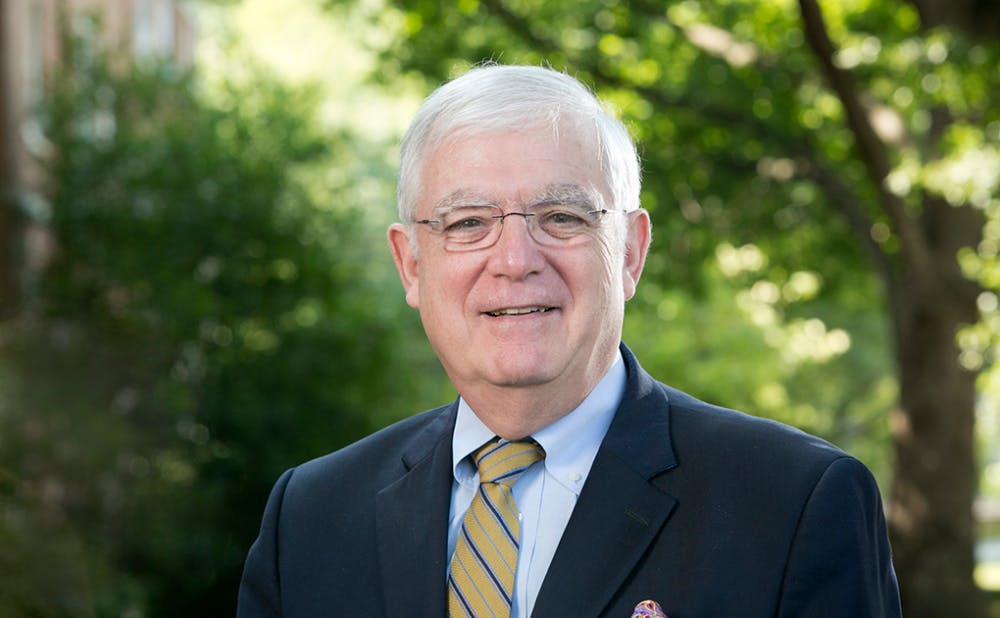Michael Merson, Wolfgang Joklik Professor of Global Health, is the founding director of the Duke Global Health Institute. Authoring over 175 articles, Merson primarily researched disease prevention, most recently focusing on HIV policy and prevention. Merson will step down from that post on June 30, but will stay involved in Duke's Office of Global Affairs. The Chronicle communicated by email with Merson about his original vision for the Institute and what his new role will look like. This interview has been edited for length and clarity.
The Chronicle: In the 10 years since its initiation, the DGHI has become one of the cornerstones of the Duke research scene. What aspects of you and your team’s initial vision do you think have contributed to this success?
Michael Merson: Certainly our interdisciplinary perspective has contributed to our success. It has been important for our research and allowed us to build a broad community of collaborators at Duke and beyond. In addition, our commitment from the outset both to education and research has resulted in an Institute that is notably comprehensive in addressing global health challenges. Not only do we seek to find solutions through research, but we are preparing the next generation of leaders in the field.
TC: One of Duke’s core strengths is its emphasis on interdisciplinary studies. How would you describe the interdisciplinary nature of the DGHI, and what differentiates Duke’s approach from those of its peers? How have you and your team encouraged collaboration across the disciplines over the years?
MM: As I mentioned above, our approach has been that almost all global health challenges are best met from an interdisciplinary approach and that notion forms the foundation for how we address much our work. For example, our undergraduate global health major, now the seventh largest major in Trinity, can only be taken as a double major and is today partnered with 25 other majors in the natural and social sciences and humanities. Similarly, our doctoral scholars program is bringing together doctoral students from eight disciplines where they share information about the methods and approaches they use in their research. It has also been quite powerful to see this in action in the field where, for example, you can see an engineer, economist, environmental scientist, and policy expert working together on projects related to clean energy and health.
TC: Duke has been a pioneer among other academic institutions for its focus on digital initiatives related to global health as well as student education among others. Based on the institute’s strategic plans as well as your experience, where do you see Duke’s priorities in global health heading in the coming years?
MM: In the last few years, our faculty members have developed two very popular MOOCs (massive open online courses) that have been [accessed] by tens of thousands of students from around the world. I am hoping we will invest much more in online education with our academic partners in Africa and Asia. We should broaden our efforts in digital health and in the use of “big data” given their potential to improve health outcomes both in the U.S. and in the tiniest village in Africa. There will no doubt be opportunities to extend our work in the global health policy space. We should position the Institute to be a player in all these areas.
TC: Global health is quite a dynamic field, owing to shifting dynamics across the world as well as medical innovation. Given these changes, in what ways do you think the DGHI has diverged from your original expectations during the planning stages?
MM: We have not diverged greatly from our original vision of the Institute. Our intent was always to address research challenges where we had faculty expertise and the need was greatest. For example, in the broad area of infectious disease, we built up our existing strength in AIDS and malaria research while also addressing newly emerging threats like influenza, Ebola and Zika. We recruited many faculty members in global mental health—in areas like autism, addiction, and depression, and in maternal health, especially in diagnosis and treatment of cervical cancer. Most recently, we have moved into the important cross-cutting areas of global health innovation and financing.
TC: On June 30, you’ll step down from your position as DGHI director but will remain vice president and vice provost of Duke’s Office of Global Affairs. How does this role interface with the DGHI and Duke’s global research interests as a whole? What else does this position entail?
MM: The Office of Global Affairs is the focal point at the University for planning and coordinating Duke’s global activities broadly. The office fosters collaborative global efforts, advances internationalization across the University, and generates awareness of Duke’s global activities within and beyond Duke’s campus. It interfaces with all of Duke, including DGHI. Duke has made global engagement a major strategic priority and the Office of Global Affairs is the broad umbrella under which that goal is being realized.
Get The Chronicle straight to your inbox
Signup for our weekly newsletter. Cancel at any time.

